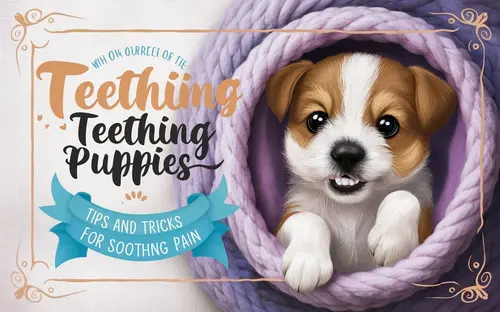Ah, the joys of bringing home a new furry bundle of happiness! As your adorable pup grows, you’ll notice them gnawing on everything in sight. This phase is known as teething, and it’s a natural process that all puppies go through. Just like human babies, puppies experience discomfort and pain as their tiny razor-sharp milk teeth start to fall out, making way for their adult pearly whites.
The Teething Timeline
Puppies typically begin teething around 3-4 months of age, and the process can last until they’re around 6-7 months old. During this time, you might notice your pup drooling more than usual, chewing on anything they can get their little jaws on, and even experiencing a slight decrease in appetite or mild irritability.
Signs Your Puppy is Teething
- Excessive chewing and gnawing on objects
- Drooling more than usual
- Bleeding or swollen gums
- Decreased appetite
- Irritability or crankiness
Soothing the Discomfort: Tips and Tricks
While teething is a natural process, it can be uncomfortable for your furry friend. Fear not, though! We’ve got some tried-and-true tips and tricks to help soothe your pup’s discomfort during this phase.
Frozen Treats and Chew Toys
One of the best ways to provide relief for your teething pup is by offering frozen treats and chew toys. The cold temperature helps numb the gums and reduce inflammation, while the chewing action massages the sore spots.
Frozen Treats to Try:
- Frozen carrots or apple slices
- Frozen Kong toys filled with peanut butter or yogurt
- Frozen beef or chicken broth ice cubes
Chew Toys to Consider:
- Rubber chew toys (make sure they’re size-appropriate)
- Rope toys
- Dental chews (under supervision)
Cold Compresses and Massages
Another soothing technique is to apply cold compresses to your pup’s gums. Simply wrap an ice cube or cold, damp cloth in a thin towel and gently press it against their gums for a few minutes at a time. You can also try gently massaging their gums with your finger to provide relief.
Preventing Destructive Chewing
As your pup seeks relief from teething discomfort, they may turn to chewing on household items like furniture, shoes, or books. To prevent this destructive behavior, it’s essential to provide them with plenty of appropriate chew toys and ensure they get enough exercise and playtime.
Puppy-Proofing Your Home
- Remove or secure any items you don’t want your pup to chew on
- Use bitter apple spray or other deterrents on surfaces you want to protect
- Provide plenty of chew toys and rotate them regularly to keep things interesting
Exercise and Playtime
Engaging your pup in physical and mental activities can help redirect their chewing urges and provide a healthy outlet for their energy. Consider taking them on walks, playing fetch, or introducing puzzle toys to keep them entertained and distracted from chewing on inappropriate objects.
When to Seek Professional Help
While teething is a normal part of a puppy’s development, there are certain situations where you should seek professional help from your veterinarian.
Signs to Watch For:
- Excessive bleeding from the gums
- Loss of appetite or refusal to eat for more than a day or two
- Lethargy or excessive irritability
- Swollen or discolored gums
Your vet may recommend pain medication or other treatments to help alleviate your pup’s discomfort and ensure their overall health and well-being.
Conclusion
Teething is a temporary phase that all puppies go through, but it can be a challenging time for both you and your furry friend.
By providing appropriate chew toys, frozen treats, and plenty of love and patience, you can help soothe your pup’s discomfort and make this transition as smooth as possible.
Remember, if you have any concerns or your puppy seems to be experiencing excessive discomfort, don’t hesitate to consult your veterinarian for professional advice.
FAQs
Q1: How long does the teething process last in puppies?
A: The teething process typically lasts from around 3-4 months of age until 6-7 months old, but the duration can vary slightly for each individual pup.
Q2: Is it normal for my puppy to drool excessively during teething?
A: Yes, excessive drooling is a common side effect of teething in puppies. This is due to the increased saliva production as they try to soothe their sore gums.
Q3: Can I give my puppy over-the-counter pain medication for teething discomfort?
A: It’s best to consult your veterinarian before giving your puppy any medication, as certain human medications can be toxic or harmful to dogs. Your vet may recommend safe pain relief options specifically formulated for puppies.
Q4: Is it okay for my puppy to chew on bones during teething?
A: While bones can provide a satisfying chewing experience, they can also pose a choking hazard or cause digestive issues if swallowed. It’s generally safer to provide your puppy with appropriate chew toys or dental chews designed specifically for puppies.
Q5: Can teething cause a loss of appetite in puppies?
A: Yes, it’s common for puppies to experience a slight decrease in appetite during the teething phase due to discomfort or soreness in their mouths. However, if your puppy stops eating altogether for more than a day or two, it’s important to consult your veterinarian.




